
The veteran's advocacy group, VoteVets.org filed an amicus curiae brief [PDF] last Wednesday in support of U.S. District Court Judge Peter Economus' recent order compelling Ohio Secretary of State Jon Husted (R) to restore Early Voting for all registered Ohio voters during the three days immediately preceding the Nov. 6, 2012 election.
The order came in response to a lawsuit filed by the Obama Campaign challenging the Buckeye State Republicans attempt to restrict voting in that period to all but active duty military. The Romney Campaign supported the Republican attempt to restrict the voting rights that had previously been shared by all state residents.
In their brief, VoteVets argues that Husted's directive adversely affects the voting rights of Ohio's more than 900,000 veterans, including more than 90,000 disabled veterans, many of whom are incapable of standing in long lines on Election Day.
The brief also alleges that the Republicans' new restrictions on Early Voting, for all but active duty military in the Buckeye State during those three days, could also arbitrarily deprive many active members of the armed forces of their right to cast an early in-person absentee ballot as well. This can occur, says the group, because Husted left the decision whether "to open those three days for in-person voting by [active military] voters...[to] the discretion of the individual county boards of elections."
The point also raises another salient legal issue, not fully considered by many of the Election Law experts who have weighed in on both the specific and broader implications of the Secretary of State's pending, expedited appeal of Judge Economus' recent decision to restore those three days of Early Voting for all...
Denying Equal Protection to military voters
While the state of Ohio is claiming a special right for active duty military voters to cast an Early Vote in the final three days before Election Day, it seems their own regulations, as VoteVets' amicus ("Friend of the Court") brief points out, actually fail to guarantee the very right they are attempting to carve out.
Contrary to a scholarly analysis by Moritz University Law Professor Steve Huefner, this case does not turn on the question of whether active duty military may or may not be afforded special access to the polls in accordance with the Uniformed and Overseas Citizens Absentee Voting Act of 1986 ("UOCAVA"). That federal law creates a separate class of voters who may be afforded special privileges, given their unique circumstances.
While all parties, including VoteVets, agree that, because of their special burdens and uncertainties, active duty military are entitled to special treatment when it comes to casting their ballot, it doesn't follow that it is necessary to deprive civilians of the ability to cast early ballots in order to afford that same right to active duty military.
First, the sequence of events, according to Emory Univ. Law Prof. Michael Kang, is significant. Here, the GOP state legislature voted to eliminate the three days before taking up the question of an exception for military voters in a separate bill. Thus, this is not a case where the legislature carefully weighed whether it was necessary to cut-off access to Early Voting for everyone else so as to provide special access to military voters.
Second, in its recent ruling, the district court had already found an undue burden and disparate impact on civilian voters, and rejected the state's justification for removing Early Voting before it turned to the UOCAVA question. While the court found Ohio's "justification for severing the electorate into two classes" --- active military and civilian --- at "first glance...appears to weigh heavily in favor of [the state]," it went on to note that the state regulations didn't actually mandate the special right they were claiming to reserve for active military.
As Judge Economus observed in his ruling, the question as to whether the polls would remain "open those three days for in-person absentee voting by UOCAVA voters remains in the discretion of the individual county boards of election." In other words, according to the GOP-enacted regulations, counties aren't even required to provide active military voters with the access that the state is now claiming they are due over all other citizens.
In its amicus ("Friend of the Court") brief, VoteVets argues that, by leaving the availability of Early Voting up to county Boards of Election, Sec. of State Husted has permitted a form of potential discrimination against active duty service members who happen to have the misfortune of residing in the wrong county. VoteVets concludes that this would result in a denial of the active duty service member's right to Equal Protection.
So too, VoteVets urges persuasively in their brief, does depriving "disabled and wounded veterans of flexibility to cast in-person absentee ballots on the three days prior to Election Day." Ohio's Republicans fail to account for them, and the more than 900,000 military veterans in the state --- many of them both disabled and recently home from war zones --- of the special access the Republicans are arguing that active duty military members are due.
The removal of existing rights
There is another key point in this case, if one that is a bit in the legalistic weeds. Nonetheless, it deserves notice here as the case is being appealed and as the votes of hundreds of thousands may be affected, in one way or another, by the ultimate ruling issued by the U.S. Sixth Circuit Court of Appeal.
Under Section 5 of the Voting Rights Act, "covered" jurisdictions cannot enact changes in their voting laws unless they prove to the U.S. Department of Justice or a three-judge district court that the change lacks (1) discriminatory purpose and (2) does not have a retrogressive effect on certain specified minority voting rights. Ohio, however, is not one of the 17 jurisdictions "covered" by Section 5 of the VRA.
Ohio's elimination of those three days of Early Voting was not challenged under Section 5 of the VRA. It was challenged, by the Obama Campaign and the Democratic Party, under the Equal Protection Clause of the 14th Amendment.
Among the "reasonable arguments" that U.C. Irvine Law Prof. Rick Hasen says could be made in an appeal against the injunction issued by Judge Economus, is whether a "non-retrogression" principle can properly be applied in a case which is not covered by Section 5 of the VRA, in which a state seeks to "remove a method of easier voting once it has used it in a past election."
Moritz Univ. Law Prof. Edward B. Foley, reiterated Hasen's concern about using a "non-retrogression" argument in a non-Section 5 constitutional challenge. However, Foley acknowledged that courts have applied a non-retrogression finding to discrimination cases where a state removes a previous remedy, as occurred in Romer v. Evans (1996) (Colorado's withdrawal of previous laws protecting gays and lesbians in the state) and the 9th Circuit's ruling in Perry v. Brown (2012) finding that once the CA Supreme Court recognized the right of same-sex marriage in the state, voters could not strip them of that right through a ballot box referendum. (Plaintiffs are asserting a similar non-retrogression theory in Brown v. Detzner, a federal case which challenges GOP-enacted legislation to reduce the number of Early Voting days in Florida from fourteen to eight.)
It was the removal of the remedy to an existing wrong and not, as suggested by Moritz' Huefner, the disparate treatment of active military vs. non-military voters, which provided the core of Judge Economus' recent ruling and order to restore the three crucial Early Voting days.
In his ruling, Judge Economus cited case law establishing the right to vote as fundamental and "preservative of all other rights" and that a "citizen has a constitutional right to participate in elections on an equal basis with other citizens." He noted that, in League of Women Voters of Ohio v. Brunner (2008) (Brunner*) the U.S. 6th Circuit applied the analysis enunciated in Bush v. Gore (2000): "Having once granted the right to vote on equal terms, the State may not, by later arbitrary and disparate treatment, value one person's vote over that of another."
As observed in the VoteVets' amicus brief, the 6th Circuit, in Brunner, ruled that "allegations could establish that Ohio's voting system deprives its citizens of the right to vote or severely burdens the exercise of that right depending on where they live in violation of the Equal Protection Clause."
Brunner entailed a legal challenge to systemic deficiencies encountered during the 2004 Presidential election, including disparate availability of voting machines, long lines, polls opening late or closing early with many voters being turned away --- the very problems which the2005 adoption of Early Absentee Voting for all in OH had originally sought to remedy.
The 6th Circuit in Brunner, in turn, cited an Illinois U.S. District Court decision, Uri v. Santee (1969), where a federal judge ruled that the unequal consolidation of 32 precincts into just 6 had violated a voters' right to equal protection where the assignment of an excessive number of registered voters forced them to wait an unreasonable length of time to obtain and cast their ballots.
In his order granting a preliminary injunction against Ohio's new regulations, written by the GOP to keep all but active duty military in the state from Early Voting during the final three days before Election Day, Judge Economus cited studies which demonstrated that the elimination of those days would disproportionately impact poor and minority voters. His data was based on studies presented during the trial, along with arguments by Cuyahoga County, showing that the elimination of Early Voting portended a return to the untenable events of 2004 --- the very debacle that had given rise to the Early Voting legislation enacted in response in 2005.
Should these new restrictions on Early Voting be ultimately restored by the courts, the result will be a rollback of rights that had previously been given to voters to help ensure that the denial of a fundamental right suffered by so many during the 2004 election might never happen again. A decision in this case for such a rollback of existing rights, could have additional reverberations across the entirety of our legal system in the bargain.
===
Ernest A. Canning has been an active member of the California state bar since 1977. Mr. Canning has received both undergraduate and graduate degrees in political science as well as a juris doctor. He is also a Vietnam vet (4th Infantry, Central Highlands 1968). Follow him on Twitter: @Cann4ing.


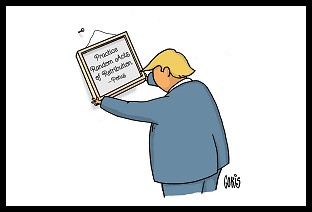 Sunday 'Random Acts of' Toons
Sunday 'Random Acts of' Toons From CA's 'Nuclear Deterrence' Map to Newsom's Trolling to Trump's 'Fascist Theatre' and Beyond: 'BradCast' 8/21/25
From CA's 'Nuclear Deterrence' Map to Newsom's Trolling to Trump's 'Fascist Theatre' and Beyond: 'BradCast' 8/21/25 'Green News Report' 8/21/25
'Green News Report' 8/21/25
 On 'Americanism' and Trump's 'Stalinesque' Plot to Whitewash U.S. History: 'BradCast' 8/20/25
On 'Americanism' and Trump's 'Stalinesque' Plot to Whitewash U.S. History: 'BradCast' 8/20/25 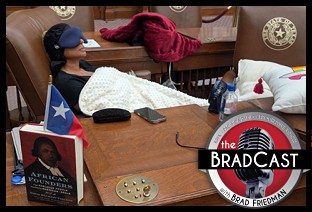 Texas GOP Imprisons Dem State Lawmaker in State House Chamber: 'BradCast' 8/19/25
Texas GOP Imprisons Dem State Lawmaker in State House Chamber: 'BradCast' 8/19/25 'Green News Report' 8/19/25
'Green News Report' 8/19/25 Trump, Nazis and
Trump, Nazis and  Sunday '
Sunday ' Newsom's 'Election Rigging Response Act'; FCC's License Renewal for Sock-Puppeting Sinclair: 'BradCast' 8/14/25
Newsom's 'Election Rigging Response Act'; FCC's License Renewal for Sock-Puppeting Sinclair: 'BradCast' 8/14/25 'Green News Report' 8/14/25
'Green News Report' 8/14/25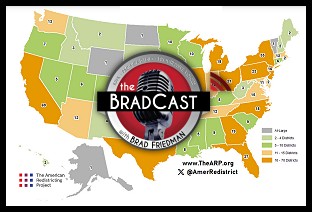 140 New House Reps?: Moving Beyond the Gerrymandering Wars: 'BradCast' 8/13/25
140 New House Reps?: Moving Beyond the Gerrymandering Wars: 'BradCast' 8/13/25 FCC Renews Sinclair TV Licenses Despite Complaint from Petitioner Who Died Waiting
FCC Renews Sinclair TV Licenses Despite Complaint from Petitioner Who Died Waiting It's Not About the Rule of Law, It's About Authoritarian Control: 'BradCast' 8/12/25
It's Not About the Rule of Law, It's About Authoritarian Control: 'BradCast' 8/12/25 'Green News Report' 8/12/25
'Green News Report' 8/12/25 After Vaccine Cancels, CDC Shooting, Former Officials Want RFK Out: 'BradCast' 8/11/25
After Vaccine Cancels, CDC Shooting, Former Officials Want RFK Out: 'BradCast' 8/11/25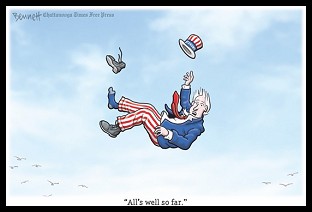 Sunday 'All's Well' Toons
Sunday 'All's Well' Toons 'Green News Report' 8/7/25
'Green News Report' 8/7/25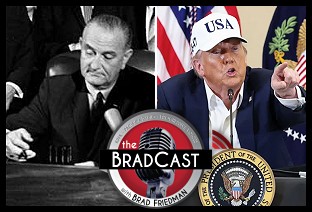 Trump Wars Against Greem Energy, Democracy on VRA's 60th: 'BradCast' 8/7
Trump Wars Against Greem Energy, Democracy on VRA's 60th: 'BradCast' 8/7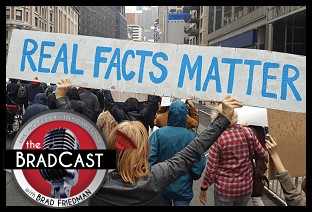 Media Conglomerates Continue Trump Capitulation: 'BradCast' 8/6/25
Media Conglomerates Continue Trump Capitulation: 'BradCast' 8/6/25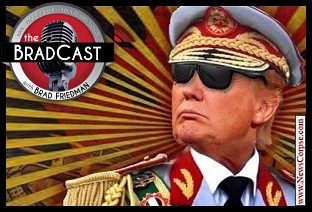 Banana Republican: Trump Shoots the Labor Statistics Messenger: 'BradCast' 8/5/25
Banana Republican: Trump Shoots the Labor Statistics Messenger: 'BradCast' 8/5/25 All's Fair in Love, War and, Apparently, Part-isan Gerrymandering: 'BradCast' 8/4/25
All's Fair in Love, War and, Apparently, Part-isan Gerrymandering: 'BradCast' 8/4/25 The Art of the Corrupt, Phony, Unlawful, Pretend Trade Deal: 'BradCast' 7/31/25
The Art of the Corrupt, Phony, Unlawful, Pretend Trade Deal: 'BradCast' 7/31/25 Battle Begins Against Trump EPA Climate Regulations 'Kill Shot': 'BradCast' 7/30/25
Battle Begins Against Trump EPA Climate Regulations 'Kill Shot': 'BradCast' 7/30/25 A Pu Pu Platter of Trump Corruption: 'BradCast' 7/29/25
A Pu Pu Platter of Trump Corruption: 'BradCast' 7/29/25 'Catastrophic' GOP Cuts to Medicaid, Medicare, ACA: 'BradCast' 7/28/25
'Catastrophic' GOP Cuts to Medicaid, Medicare, ACA: 'BradCast' 7/28/25
 VA GOP VOTER REG FRAUDSTER OFF HOOK
VA GOP VOTER REG FRAUDSTER OFF HOOK Criminal GOP Voter Registration Fraud Probe Expanding in VA
Criminal GOP Voter Registration Fraud Probe Expanding in VA DOJ PROBE SOUGHT AFTER VA ARREST
DOJ PROBE SOUGHT AFTER VA ARREST Arrest in VA: GOP Voter Reg Scandal Widens
Arrest in VA: GOP Voter Reg Scandal Widens ALL TOGETHER: ROVE, SPROUL, KOCHS, RNC
ALL TOGETHER: ROVE, SPROUL, KOCHS, RNC LATimes: RNC's 'Fired' Sproul Working for Repubs in 'as Many as 30 States'
LATimes: RNC's 'Fired' Sproul Working for Repubs in 'as Many as 30 States' 'Fired' Sproul Group 'Cloned', Still Working for Republicans in At Least 10 States
'Fired' Sproul Group 'Cloned', Still Working for Republicans in At Least 10 States FINALLY: FOX ON GOP REG FRAUD SCANDAL
FINALLY: FOX ON GOP REG FRAUD SCANDAL COLORADO FOLLOWS FLORIDA WITH GOP CRIMINAL INVESTIGATION
COLORADO FOLLOWS FLORIDA WITH GOP CRIMINAL INVESTIGATION CRIMINAL PROBE LAUNCHED INTO GOP VOTER REGISTRATION FRAUD SCANDAL IN FL
CRIMINAL PROBE LAUNCHED INTO GOP VOTER REGISTRATION FRAUD SCANDAL IN FL Brad Breaks PA Photo ID & GOP Registration Fraud Scandal News on Hartmann TV
Brad Breaks PA Photo ID & GOP Registration Fraud Scandal News on Hartmann TV  CAUGHT ON TAPE: COORDINATED NATIONWIDE GOP VOTER REG SCAM
CAUGHT ON TAPE: COORDINATED NATIONWIDE GOP VOTER REG SCAM CRIMINAL ELECTION FRAUD COMPLAINT FILED AGAINST GOP 'FRAUD' FIRM
CRIMINAL ELECTION FRAUD COMPLAINT FILED AGAINST GOP 'FRAUD' FIRM RICK SCOTT GETS ROLLED IN GOP REGISTRATION FRAUD SCANDAL
RICK SCOTT GETS ROLLED IN GOP REGISTRATION FRAUD SCANDAL VIDEO: Brad Breaks GOP Reg Fraud Scandal on Hartmann TV
VIDEO: Brad Breaks GOP Reg Fraud Scandal on Hartmann TV RNC FIRES NATIONAL VOTER REGISTRATION FIRM FOR FRAUD
RNC FIRES NATIONAL VOTER REGISTRATION FIRM FOR FRAUD EXCLUSIVE: Intvw w/ FL Official Who First Discovered GOP Reg Fraud
EXCLUSIVE: Intvw w/ FL Official Who First Discovered GOP Reg Fraud GOP REGISTRATION FRAUD FOUND IN FL
GOP REGISTRATION FRAUD FOUND IN FL

































